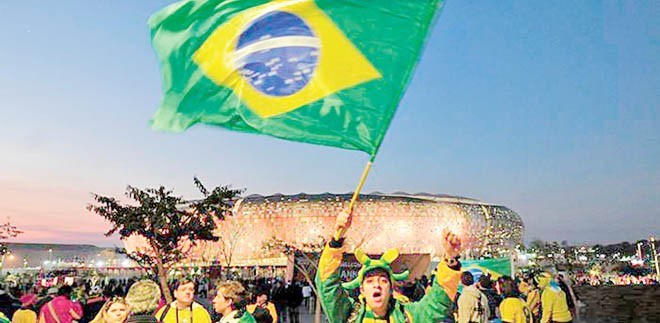

With just under three months to go, the World Cup in Brazil is starting to come into view. The host nation will kick off the tournament on June 12 against Croatia. In the weeks to come, the build-up will, slowly but surely, start occupying our TV screens, newspapers and magazines. It goes without saying that the regular viewers of ‘the beautiful game’ will follow the build-up on a daily basis, and will be glued to their TV sets when the tournament begins. However, the real magic of the World Cup lies in its powerful ability to capture the imagination of casual football viewers and to transform them overnight into devoted followers for a month.
Despite the fact that only 32 national teams compete in the World Cup, after going through a lengthy qualifying campaign, it is very much a global event. Irrespective of whether their team is at the tournament or not, people across the planet tune in to see it. Everyone watches the games or, at the very least, stays in the know on how the tournament is progressing - if not out of interest, then due to the fear of missing out. No one likes being the only person in the office not part of the conversation. And that is the point. For that one month, the World Cup is ‘the’ conversation. In this sense, the World Cup is like the Olympics. Only bigger. FIFA claims the World Cup is the most viewed sporting event on the planet.
Pakistan is a microcosm of this global phenomenon. During the previous World Cup, large corporate-sponsored screens were put up in major cities across the country. People stayed up on weeknights for games kicking off at midnight local time, in some cases not even knowing the names of the teams playing, identifying them only by their shirt colours. For a country, where football is still a fringe sport, despite its rising appeal, this should be remarkable and unique. Yet, whenever the World Cup comes around, the story is the same across numerous other countries considered ‘non-footballing’ nations. Such is the magnetic appeal of the World Cup.
The fact that this year’s tournament is in Brazil - the most successful footballing nation in the history of the sport - adds an aura of mystique to the event. Several of the players and managers expected to participate have testified to as much themselves. Brazil, as a venue, is to football what Lord’s is to cricket, Wimbledon is to Tennis and Augusta is to Golf. It’s special. It just is.
However, despite everything the World Cup has going for it - which is an awful lot - there is one key thing missing. The World Cup isn’t where the best football is played. For that, one has to turn to the UEFA Champions League - the annual European club competition in which the top club teams across the continent compete for the crown. ‘Why?’ I hear you ask. Because the top European club teams are better than the top national sides. Bayern Munich, Real Madrid and Barcelona, for example, would be favourites against any national team you can pit against them, Spain and Germany included. There are two main reasons for this.
Firstly, unlike national teams, club sides are not constrained by nationalities when it comes to choosing players. Club sides can recruit any player in the world provided they can agree financial terms with the club the player belongs to, and the player himself. Therefore, the pool of talent that club sides can tap into is significantly larger than that of the national teams. This is the reason Real Madrid can have Ronaldo, Bale and Casillas, and Barcelona can have Messi, Neymar and Iniesta, in the same team.
Secondly, and perhaps even more importantly, players spend far more time playing for their clubs than they do with their national sides. Players train with their club mates on a daily basis, and usually play one or two competitive club matches each week throughout the season. This enables the club side to continuously work on correcting any mistakes, building team chemistry and finding a system of play that makes optimal use of their squad of players. In contrast, players only meet up with their national side once every couple of months to train for a few days, and play one or two matches, before returning to their respective club sides. Due to the scarcity of time that national sides have, they can never match the club sides in terms of thoroughness of preparation and fine-tuning of the system of play. As a result, the level of football displayed by top European clubs when they play against each other in the Champions League, usually in the latter stages of the tournament, is unparalleled.
The World Cup comes once every four years. It continues to be the most exclusive club a footballer can join. National pride and sporting immortality are at stake. Hundreds of millions, if not billions, around the world watch it on TV. Given all that, it would be fair to say that the World Cup continues to be the most popular and prestigious footballing event in the world. But if you are looking for the highest quality of football on the pitch, you’ll have to look elsewhere.